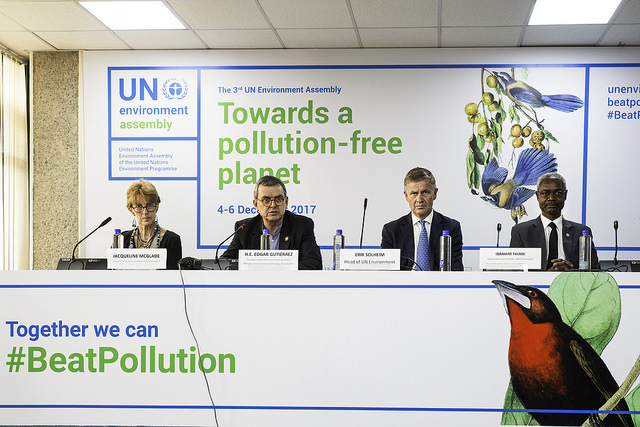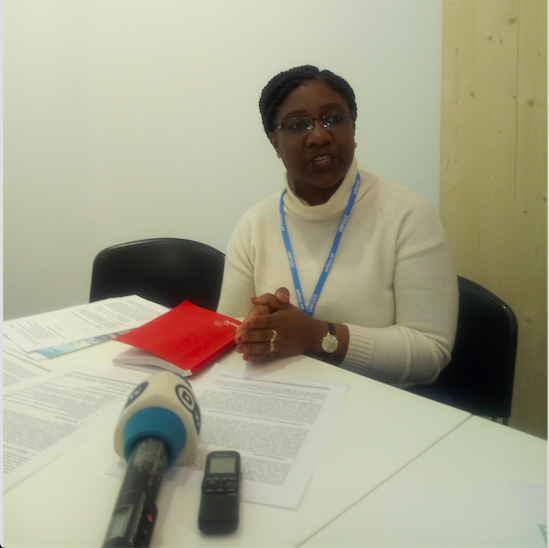
PAMACC News (NAIROBI, Kenya)
The world today committed to a pollution-free planet at the close of the UN Environment Assembly in Nairobi, with resolutions and pledges promising to improve the lives of billions across the globe by cleaning up our air, land and water.
If every promise made in and around the summit is met, 1.49 billion more people will breathe clean air, 480,000 km (or around 30 per cent) of the world’s coastlines will be clean, and USD 18.6 billion for research and development and innovative programmes to combat pollution will come online.
“The science we have seen at this assembly shows we have been so bad at looking after our planet that we have very little room to make more mistakes,” said Dr. Edgar Gutiérrez, Minister of Environment and Energy of Costa Rica and the President of the 2017 UN Environment Assembly.
“With the promises made here, we are sending a powerful message that we will listen to the science, change the way we consume and produce, and tackle pollution in all its forms across the globe.”
Over 4,000 heads of state, ministers, business leaders, UN officials, civil society representatives, activists and celebrities gathered at the summit in Nairobi, which ran for three days.
For the first time at a UN Environment Assembly, environment ministers issued a declaration. This declaration said nations would honour efforts to prevent, mitigate and manage the pollution of air, land and soil, freshwater, and oceans – which harms our health, societies, ecosystems, economies, and security.
The declaration committed to increasing research and development, targeting pollution through tailored actions, moving societies towards sustainable lifestyles based on a circular economy, promoting fiscal incentives to move markets and promote positive change, strengthening and enforcing laws on pollution, and much more.
The assembly also passed 13 non-binding resolutions and three decisions. Among them were moves to address marine litter and microplastics, prevent and reduce air pollution, cut out lead poisoning from paint and batteries, protect water-based ecosystems from pollution, deal with soil pollution, and manage pollution in areas hit by conflict and terrorism.
“Today we have put the fight against pollution high on the global political agenda,” said Erik Solheim, head of UN Environment. “We have a long struggle ahead of us, but the summit showed there is a real appetite for significant positive change.
“It isn’t just about the UN and governments, though. The massive support we have seen from civil society, businesses and individuals – with millions of pledges to end pollution – show that this is a global challenge with a global desire to win this battle together.”
A large part of the impact from the assembly comes from global support. UN Environment’s #BeatPollution campaign hit almost 2.5 million pledges during the event, with 88,000 personal commitments to act.
Chile, Oman, South Africa and Sri Lanka all joined the #CleanSeas campaign during the Nairobi summit, with Sri Lanka promising to implement a ban on single-use plastic products from 1 January 2018, step up the separation and recycling of waste, and set the goal of freeing its ocean and coasts of pollution by 2030. There are now 39 countries in the campaign.
Colombia, Singapore, Bulgaria, Hungary and Mongolia joined 100 cities who were already in the #BreatheLife campaign, which aims to tackle air pollution. Every signatory has committed to reduce air pollution to safe levels by 2030, with Singapore promising to tighten fuel and emissions standards for vehicles, and emissions standards for industry.
The global momentum comes not a moment too soon, as the UN Environment report, The Executive Director’s Report: Towards a Pollution-Free Planet, lays out.
Overall, environmental degradation causes nearly one in four of all deaths worldwide, or 12.6 million people a year, and the widespread destruction of key ecosystems. Air pollution is the single biggest environmental killer, claiming 6.5 million lives each year.
Exposure to lead in paint causes brain damage to 600,000 children annually. Our seas already contain 500 “dead zones” with too little oxygen to support marine life. Over 80 per cent of the world’s wastewater is released into the environment without treatment, poisoning the fields where we grow our food and the lakes and rivers that provide drinking water to 300 million people.
There is also a huge economic cost. A recent report by the Lancet Commission on Pollution and Health says that welfare losses due to pollution are estimated at over USD 4.6 trillion each year, equivalent to 6.2 per cent of global economic output.
“We had two missions at this assembly,” said Ibrahim Thiaw, UN Environment’s deputy head. “One [agreeing on action] is accomplished. The second we must start tomorrow.”











